|
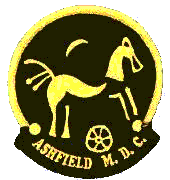
| |
NORMAN DAYNES
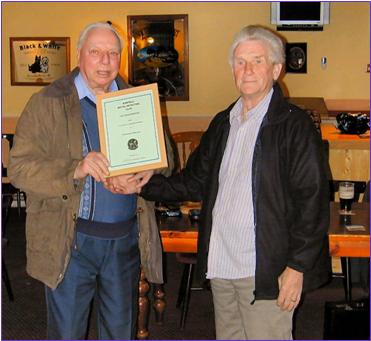
|
Norman
Daynes is shown here, on the left, accepting his Life
Membership certificate of the Ashfield Metal Detecting Club
from Dennis Brown, the club chairman. Norman was one of the
founding members of the club when it was formed in 1994 and
now into his eighties is still an active club member, hardly
missing a club night or, until recently, a club search
throughout all this time. He is a skilled and dedicated
detectorist, this is confirmed by his enviable club record
of twenty ‘Find of the Month’ and two ‘Find of the Year’
awards to date.
BEST FIND |
|
Norman’s best find on a club search is pictured here. It is
a superb solid silver double ended seal of the Warburton
family. A full account of this find and the Treasure Act
proceedings is on the club website,
www.ashfield-mdclub.g7jjf.com. |
 |
|
FIND
OF THE MONTH FEBRUARY
COIN:- David Rhodes. Edward Hammered silver
penny.
No image available.
ARTEFACT:- Alan Roberts. Medieval key.
No image available.
FIND
OF THE MONTH MARCH
COIN:- John Radford. James1 shilling
ARTEFACT:- John Radford. Bronze Age dagger.
|

John Radford James 1 Shilling |

John Radford bronze age dagger |
|
|
|
FIND OF THE MONTH
APRIL
COIN:- Jonathan Bryant. Roman
denarius of Marcus Aurelius.
No image available.
ARTEFACT:- Dave Hallam. Bronze
Age Palstave axe
|
|
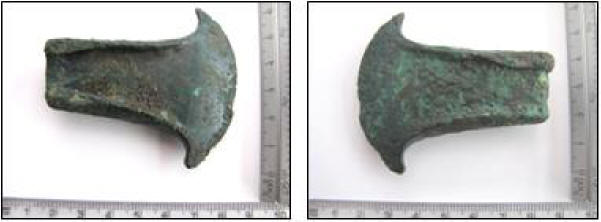
David Hallam Bronze Age palstave axe.
|
|
FIND
OF THE MONTH MAY
COIN:- John Radford. Roman
denarius of Hadrian.
ARTEFACT:- Dave Rhodes. Saxon
brooch.
No image available.
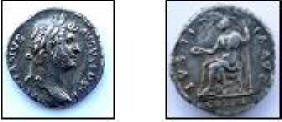
John Radford Roman denarius of
Hadrian. |
|
FIND
OF THE YEAR 2009—2010
COIN:- David Rhodes. Henry V111 groat.
ARTEFACT:- John Radford. Bronze Age dagger. See Find of the Month
for March image.

Dave Rhodes Henry V111 groat. |
|
***
SPEAR

This superb example of a spear was
found on the same farm as David Hallam’s Palstave Axe. It was found
by one of the farm workers, “eyes only” without a metal detector!
*** |
  |
90 BC. ROMAN REPUBLIC DENARIUS.
This coin was found by John Gough on
a recent club search. It is a silver denarius minted by the
Calpurnia family in 90 BC.
Obverse:- Laureate head of Apollo
facing right, with symbol behind the head and near chin. Reverse:-
Horseman with torch galloping right. Below:- L. PISO FRVGI. in one
line and RA a monogram for Roma underneath
JMBG.
As found.
As it should be.
|

 |
|
COMMITTEE FOR 2010 - 2011
CHAIRMAN
SECRETARY
TREASURER |
|
 |
 |
 |
|
Dennis Brown
John Gough
Mary Severn |
|
SEARCH SECRETARIES |
|
 |
 |
 |
|
Jeff Oscroft
Paul Wigginton
David Hallam |
|
COMMITTEE |
|
 |
 |
 |
|
Dave Rhodes |
Pat Walker
Nigel Warren |
|
|
|
|

Graham and June Reedman are two new committee members. June is
the search marshal with responsibilities for the conduct of
searches.They both declined to have their photographs included
in the newsletter and requested that a caricature be used to
represent each of them. After weeks of browsing the web and
various books, including the Kama Sutra, it was unanimously
decided that the above image was the most accurate likeness of
the pair.
***
|
RICHARD'S 'WAITE'
IS OVER! |
|
|
 |
 |
|
Richard Waite with his first
hammered coin, an Edward silver penny. |
John Radford, Richard and Jeff Oscroft examining Richard's find. |
|
This superb 1889 Victoria Crown was also found by Richard on a
recent club search.
|
 |
***
|
EDWARD 111
HAMMERED SILVER PENNY.
Anthony
James found this beautiful example of a hammered silver
penny on a recent club search. The coin was identified on
the UK Detector Finds Database as an Edward 111 penny minted
in London, fourth coinage, treaty period 1363—1369. |
 |
The obverse
reads:- EDWARD ANGL R DNS HYB. Crowned bust facing.
The reverse
reads:- CIVITAS LONDON.
Long cross
with three pellets in each quarter.
***
|
 |
|
EVERY PICTURE TELLS A STORY! |
|
 |
|
Tony Elliott and John Gough caught in an
unguarded moment by the club’s phantom photographer. The
detectorists were taking advantage of the seat provided by some
thoughtful person. Both agree that it should be compulsory for
every field over five acres to have one. Tony strongly denies
that he was asleep, he maintains he was only resting his eyes!
*** |
 |
 |
|
ARTEFACT OF THE
YEAR AWARD
Dennis Brown,
club chairman, (left) presenting John Radford with the
Artefact of the Year shield for his Bronze Age dagger. |
COIN OF THE YEAR
AWARD
Dave Rhodes
being presented by Dennis Brown with the Coin of the Year
shield for his Henry V111 groat. |
|
***
HAPPY RETIREMENT PAT. |
|
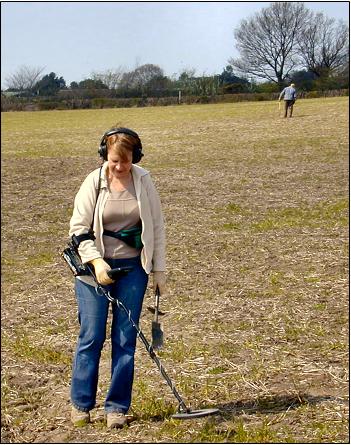 |
|
Pat Walker has been a member of the Ashfield Metal Detecting
Club since its founding in 1994. Unfortunately her duties as a
midwife restricted the number of club searches she could attend.
Recently retired from work she hopes to spend more time on club
searches and metal detecting in general. Pat is seen here on a
recent club search although finds were scarce the lovely weather
made up for it.
*** |
|
COULD BE FUN, AND IT'S
FREE |
|
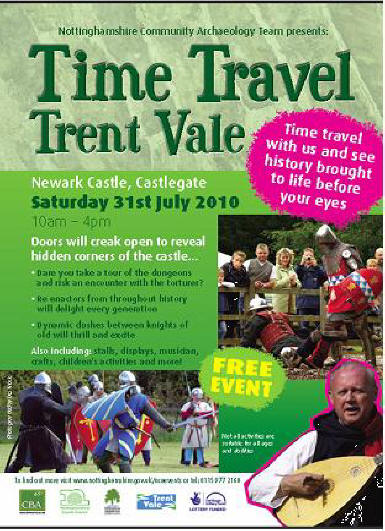 |
|
ROMAN
“SWISS” ARMY PENKNIFE |
|
 |
A genuine
Roman multipurpose tool complete with knife, fork, spoon,
scribe and earwax spoon .
|
|
*** |
|

Dave Rhodes
presenting Dennis Brown with the shield for Detectorist of
the Year.
***
ANY IDEAS?
A lady, (not a detector user) has asked the club to publish
in the newsletter and include on the club website details of
a statuette in her possession. The object is 53 centimetres
high, very heavy possibly made of lead using the lost wax
process. It has a green patina with traces of gilt. Found in
Oxfordshire.
She is wearing greaves so perhaps is a Goddess
of war, Athena perhaps? Any information please contact John
Gough at john.gough1@ntlworld.com.
*** |
 |
|
BUSTS ON ROMAN COINS THAT MAY BE
FOUND IN BRITAIN (4) |
|
 |
SEPTIMIUS
SEVERUS 193 - 211 Lucius Septimius Severus
was born in 146 AD. in North Africa. He was an
outstanding soldier and became commander of the armies
in Upper Pannonia. After the murder of Pertinax he was
proclaimed emperor by the troops on the Danube. He
defeated Didius, Percennius Niger and Cloduis Albinus
becoming undisputed ruler of the whole empire. In 208AD
he visited Britain and died at York in 211AD.
CARACALLA
198 - 217 M Aurelius Antoninus was born in Gaul
in 188AD. The eldest son of Septimius Severus. The
nickname Caracalla came from his use of a long tunic of
that name. On the death of Septimius Severus he reigned
as emperor with his younger brother, Geta. The pair did
not get on and Caracalla murdered Geta to became sole
ruler. His was a cruel and extravagant reign ending when
he was assassinated in 217AD.
GETA
209 - 212. Lucius Septimius Julius Geta was the
younger son of Septimius Severus and Julia Domna, he was
born in Rome in 189AD. After only ten months as joint
emperor with his older brother Caracalla he was murdered
by him. He was only 23 years of age then. Caracalla
ordered all statues of Geta to be destroyed, all
inscriptions naming him to be erased and all coins with
the portrait of Geta or his name on them to be melted
down.
MACRINUS
217 - 218. Marcus Opelius Severus Macrinus
was born in 164 AD at Caesarea in Mauretania. He trained
as a lawyer but eventually became Prefect of the
Pretorian Guards. Whilst he was campaigning in
Mesopotamia he had the Emperor Caracalla killed and was
made Augustus by the troops. After a disastrous war with
the Parthians the army revolted. Macrinus fled with his
son, Diadumenian, they were caught and executed.
Elagabalus
218 - 222. Varius Avitus Bassianus was born
in 205 AD in Syria. He was called Elagabalus having
obtained the position of High Priest to the deity of the
same name who was much worshipped in Syria. After
Macrinus was killed Elagabalus was declared emperor by
the troops and Senate. His short reign was marked by his
utter depravity and sexual activities. Eventually the
Praetorian Guard mutinied and killed him and his mother,
throwing their bodies into the River Tiber. After his
death the senate expunged his name from the records.
Severus
Alexander 222 - 235. Bassanianus
Alexianus was born in Phoenicia in 208 AD, he was
adopted by Elagabalus in 221 AD and titled Caesar, he
then took the names Marcus Aurelius Alexander. On the
death of Elagabalus he was proclaimed emperor using the
name Severus Alexander. He ruled wisely and well. In
235AD he was killed by Maximinus one of his guards
*** |
 |
BOOKSHELF
In this newsletter I would like to introduce you to
“Twenty Miles round Mansfield” the 1835 Sanderson Map. I
bought my copy a few years ago at the local library for
£8.99, well worth the cost. A copy of the original is
priced at £2200 from the Shapero Gallery. I was
privileged to see a copy of this map, seven foot wide,
laid out in its circular form covering a living room
floor. It shows every field boundary within a forty mile
diameter ranging from Sheffield, north, Derby and
Nottingham, south, and from Newark in the east to
Bakewell in the west. It covers three quarters of
Nottinghamshire, half of Derbyshire and small areas of
Yorkshire. A friend of mine and fellow detectorist, Jack
Archer sadly no longer with us, had the map
professionally photographed and gave me a copy in A2
size sheets. If any club member wishes to research an
area covered by the map I will, by prior arrangement
bring it to a club meeting for viewing
JMBG.
|
|
GREAT SEAL OF THE KING OF ENGLAND
EDWARD 111, 1327—1377. |
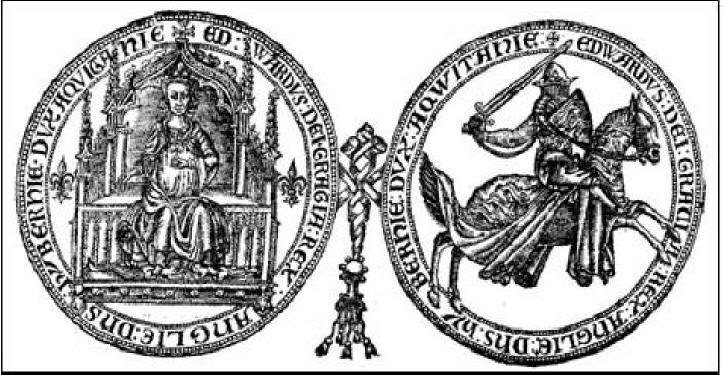 |
|
 |
ARTICLES WANTED FOR NEWSLETTER
The figure on the left is one of the older club members
thinking hard about an article for a future issue of the
club newsletter. He is not named for legal reasons.
Seriously, articles, suggestions,
photographs and ideas are urgently wanted for the
newsletter. Apart from two or three members who
contribute regularly, other club members do not seem to
be interested. The more contributions that come in, the
more frequently the newsletter can be issued.
If this photograph inspires anyone to do anything for
the newsletter please contact John Gough at a club
meeting, on a club search or by email to john.gough1@ntlworld.com.
Thank
you.
|
|

